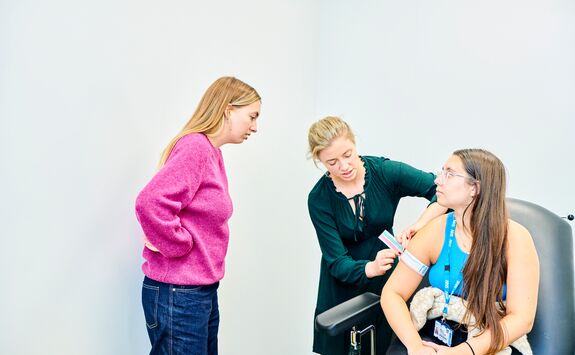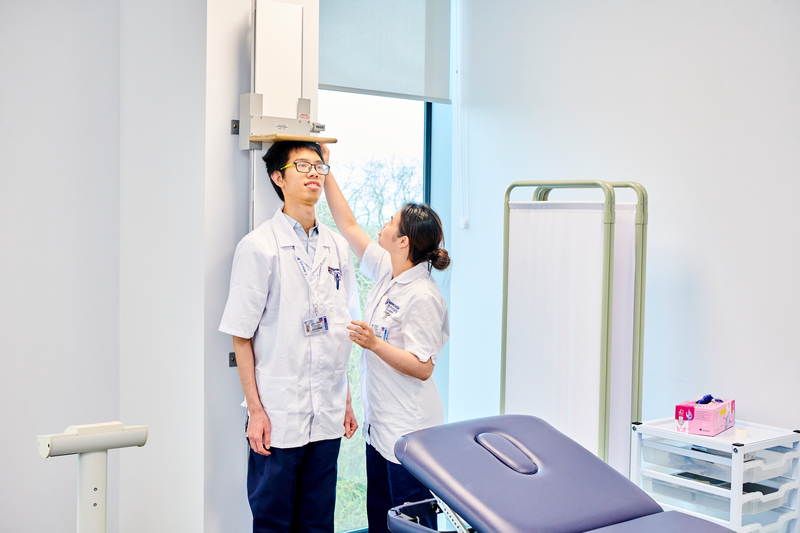Dietetics
This integrated master's dietetics degree will equip you with the specialist knowledge and skills needed to become a competent and effective dietitian.
What is Dietetics?
Dietetics is the science of how nutrition affects our health. To qualify as a dietitian, you need to study all areas of nutrition related to human health and disease, ranging from the natural and clinical sciences through to the social sciences, developing the competencies to work with people to change lives, and contribute to the welfare of society.
Study with us to become a clinically adept dietitian who uses knowledge of science, food, psychology, and the human body to educate, empower and give practical advice on changing diet and lifestyle behaviours to individuals, groups and communities.
You will benefit from:
- A 4-year integrated master's programme
- Interdisciplinary learning opportunities with students from other healthcare programmes in our Faculty of Medicine
- Opportunities to develop your practical skills in measurement and assessment of dietary intake and nutritional status/body composition, menu planning, and recipe modification for therapeutic diets
- A case-based learning approach
- Integrated practice placements across all years in a range of settings
- A master's research project with world-leading researchers
- Attending a national conference where you’ll hear from experts in nutrition and dietetics

Our learning was such a great mixture of practical and interactive as well as your typical sit down lectures ... I always felt engaged.
Research-Led Teaching
Research-led teaching is extremely important to us to ensure that our curriculum is up-to-date and innovative. All of our staff are actively involved in research and there are several opportunities for students to get involved in research throughout their degree.
We enjoy close links with the Faculty of Medical Sciences world-leading research institutes.
Our students gain knowledge of the latest developments and discoveries in human nutrition. They learn about the maintenance of health and wellbeing, and the role of nutrition in disease.
Student Research Projects
Our MDiet students are actively involved in research from within their studies, particularly through dedicated project modules in Years 3 and 4. Some also take additional opportunities offered by the University, such as Summer Research Internships.
These experiences not only enhance their academic skills but also lead to valuable research outputs - with a number of students gaining publications, presenting at national conferences, and contributing to real-world initiatives that stands out on their CVs.
.png)
Our learning environment is designed to support and encourage students to pursue personal and professional development beyond the core curriculum. This culture of support and ambition has contributed to our MDiet students being named the British Dietetic Association’s Student Champion of the Year for three consecutive years.
This national award celebrates students who demonstrate exceptional commitment to promoting the dietetic profession outside of their academic studies — highlighting the initiative and impact our students are making. We are so proud of Marta Buczkowska, Jacob Hamilton, and Shona Wells, who have won this award in 2022, 2023, and 2024 respectively.
BDA Research Symposium
Each year, our Stage 3 Dietetics students attend the British Dietetic Association Research Symposium - a national forum for research, professional development, and networking. It’s an opportunity for students to see the real-world relevance of the research they’re undertaking as part of their studies.
Students often leave feeling inspired, having discovered new areas of interest and gaining confidence in their future as dietitians. The experience includes an overnight stay and a group dinner - a fantastic way to bond with peers and build lasting professional connections.
This year’s conference was a celebration of our wider community: Stephanie Wakefield, a member of our academic team and research dietitian, presented her work, and graduate Holly Robertson returned to share the findings from her final-year project.
